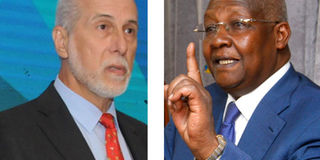Government demands role to monitor DGF activities

EU head of delegation in Uganda Attilio Pacifici (L) and Foreign Affairs minister Sam Kutesa
Government has demanded to take part in the management of Democratic Governance Facility (DGF), an NGO, to monitor its activities and how it funds the beneficiaries.
The demand was made as one of the conditions to allow DGF resume its operations in Uganda following the suspension by the President early this year
The demand was presented on Friday during a meeting between Ugandan officials led by Foreign Affairs minister Sam Kutesa and European ambassadors who pool money to DGF.
The ambassadors included the head of European Union delegation in Uganda, Mr Attilio Pacifici, Austria’s Roswitha Kremer, Denmark’s Nicolaj Petersen, Sweden’s Per Lingarde, Netherland’s Karin Boven, and Norway’s Elin Johansen, and Ireland’s John Carlos
The Ugandan side also included State minister for International Affairs Okello-Oryem, Finance minister Matia Kasaija and Mr Obiga Kania, the Internal Affairs state minister.
Diplomatic sources told Daily Monitor that involvement in managing DGF affairs is the main demand government has so far made to the donors.
Sources indicated that government is convinced, and has previously told the European diplomats, that the DGF previously funded “many dodgy programmes” under cover.
Sources, however, said the diplomats appeared hesitant about the government’s demand to be involved in monitoring DGF finances and operations.
Finance minister Kasaija declined to comment on the claims and referred Daily Monitor to Mr Kutesa as the convener of the Friday meeting. Mr Kutesa did not pick or return our calls for a comment.
The Ministry of Foreign Affairs in a statement issued after the meeting, only said “the two sides agreed on an amicable way forward.” Sources intimated that a follow up meeting is scheduled during this week.
Asked yesterday about the “amicable way forward” contained in the Ministry of Foreign Affairs statement, the Danish ambassador, Mr Nicolaj Hejberg Petersen, told this newspaper “we are in constructive dialogue with government and all issues will be dealt with in a constructive manner.”
The latest development comes as DGF stopped funding to many institutions after Mr Kasaija wrote to them officially on February 17, suspending its operations in Uganda.
Mr Kasaija’s communication followed President Museveni’s letter on January 2 to him.
Mr Museveni said DGF had been “irregularly and unilaterally” authorised by the Ministry of Finance Permanent Secretary to “be operated exclusively by a foreign mission in Uganda.”
He described the authorisation of DGF at its commencement as “unacceptable” and further directed police and Inspector General of Government to investigate how it was licensed.
However, during a meeting with European envoys on February 18, President Museveni agreed to lift the suspension of DGF activities and blamed officials of the Ministry of Finance for allegedly signing the DGF agreement without involving Cabinet or seeking approval from the Attorney General, the chief government legal advisor.
He proposed that DGF and government team discuss a new relationship plan how both sides will work together in the future.
Background
The DGF started in 2011 as a five-year programme, which was extended. The entity is now running its second five-year plan until December 2022. Denmark is currently the development partners’ chair of DGF which supports some 78 institutions, both state and non-state actors.




